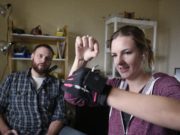Since 2012, Penn State’s Center for Online Innovation in Learning (COIL) has focused on building and sustaining a culture of collaboration and invention with the aim of improving teaching and learning. Now COIL has merged with the Penn State EdTech Network, furthering the university’s mission to promote the education technology sector in Pennsylvania.
“The EdTech Network is leveraging the wealth of resources that already exist at Penn State — students with great ideas, faculty leadership, and staff with subject matter expertise,” explains Daren Coudriet, the Network’s director. “It is serving as a facilitator and catalyst, creating an innovation cycle with the goal of advancing Penn State and generating new businesses in the Commonwealth…COIL [will] serve as the Network’s innovation engine.”
COIL’s Research Initiation Grants (RIGs) provided seed funding during the development and proof-of-concept stages to research projects that had the potential to enhance teaching and learning through online innovation. It is expected that most of the project teams funded by COIL use the preliminary evidence generated to pursue external funding for larger-scale studies.

Under the merger, COIL will no longer be awarding RIGs, but the EdTech Network will be rolling out new funding opportunities in the coming year.
“COIL has built a tremendous program around Research Innovation Grants (RIGs) that have an excellent reputation for funding innovative faculty research ideas,” says Coudriet. “By integrating the core components of the RIG program into the EdTech Network — while involving industry partners and focusing on the intersection of educational technology and artificial intelligence (which is becoming a core focus for the Network) — the revised program will be more highly leveraged and produce greater return on the investment.”
The EdTech Network is leveraging the wealth of resources that already exist at Penn State — students with great ideas, faculty leadership, and staff with subject matter expertise.
Over the years, RIG grants have spawned numerous success stories. The titles tell it all: ClassGotcha: Goal-Oriented Personalized Online Learning Management System Supported by Educational Data Mining, a student startup; Building Online Books Using Open Educational Resources for Zero Cost Personalized and Collaborative Learning, directed toward reducing the cost of textbooks; and Using Online Learning Technology to Improve Social Skills for Individuals with Autism, which received a $1.5 million grant from the National Institutes of Health.
In its latest RIG round, COIL is funding “The Development of a Computer Simulated Child Abuse Screening Tool“; “Using Virtual Reality to Enhance Distance Education for Additive Manufacturing“; “Leveraging Robots to Enhance Student and Staff Collaboration: An Exploration of Social, Cognitive, and Emotional Presence“; and “Using Educational Data Mining to Increase Temporal Participation in Online Courses.”

The EdTech Network also hosts speakers and events. In October, they will launch EdTech Engage, an inaugural symposium for researchers and solution companies in artificial intelligence, machine learning and related fields.
So why is Penn State so focused on promoting EdTech in the Commonwealth?
“I would say the biggest asset is the number of universities and colleges in the state of Pennsylvania,” says Coudriet. “They are the buyers of educational technology solutions and critical for EdTech startups’ success. They provide a wealth of talented students that embrace technology, serve as the source for innovative ideas and are often users of the EdTech solutions.”
And they can serve as a source of innovation — if they embrace the mission to serve the 21st century student.
“The biggest challenge [is] the ability for colleges and universities to critically examine century-old business models, foster innovation and embrace the scale of distribution that will lead to educational transformation,” he adds. “With the proper perspective, disruption can be a source of opportunity.
“Pennsylvania has the opportunity to lead the United States in leveraging the internet and other advanced technologies to transform higher education. In doing so, it could create a statewide EdTech startup ecosystem to attract companies from across the globe.”
ELISE VIDER is news editor of Keystone Edge.



